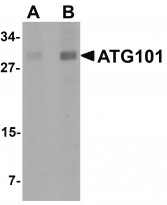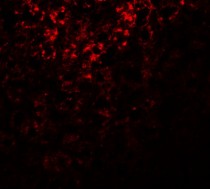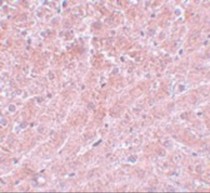ARG54919
anti-ATG101 antibody
anti-ATG101 antibody for ELISA,ICC/IF,IHC-Formalin-fixed paraffin-embedded sections,Western blot and Human,Mouse,Rat
Cell Biology and Cellular Response antibody; Cell Death antibody
Overview
| Product Description | Rabbit Polyclonal antibody recognizes ATG101 |
|---|---|
| Tested Reactivity | Hu, Ms, Rat |
| Tested Application | ELISA, ICC/IF, IHC-P, WB |
| Host | Rabbit |
| Clonality | Polyclonal |
| Isotype | IgG |
| Target Name | ATG101 |
| Antigen Species | Human |
| Immunogen | Synthetic peptide (16 aa) within aa. 80-130 of Human ATG101. |
| Conjugation | Un-conjugated |
| Alternate Names | Autophagy-related protein 101; C12orf44 |
Application Instructions
| Application Suggestion |
|
||||||||||
|---|---|---|---|---|---|---|---|---|---|---|---|
| Application Note | * The dilutions indicate recommended starting dilutions and the optimal dilutions or concentrations should be determined by the scientist. | ||||||||||
| Positive Control | Human Liver Tissue Lysate |
Properties
| Form | Liquid |
|---|---|
| Purification | Affinity purification with immunogen. |
| Buffer | PBS and 0.02% Sodium azide |
| Preservative | 0.02% Sodium azide |
| Concentration | 1 mg/ml |
| Storage Instruction | For continuous use, store undiluted antibody at 2-8°C for up to a week. For long-term storage, aliquot and store at -20°C or below. Storage in frost free freezers is not recommended. Avoid repeated freeze/thaw cycles. Suggest spin the vial prior to opening. The antibody solution should be gently mixed before use. |
| Note | For laboratory research only, not for drug, diagnostic or other use. |
Bioinformation
| Database Links | |
|---|---|
| Gene Symbol | ATG101 |
| Gene Full Name | autophagy related 101 |
| Background | ATG101 Antibody: Autophagy, the process of bulk degradation of cellular proteins through an autophagosomic-lysosomal pathway is important for normal growth control and may be defective in tumor cells. It is involved in the preservation of cellular nutrients under starvation conditions as well as the normal turnover of cytosolic components. This process is negatively regulated by TOR (Target of rapamycin) through phosphorylation of autophagy protein ATG1. ATG101 is a recently discovered protein that stabilizes ATG13, another autophagy protein that forms a complex with the mammalian homologs of ATG1, ULK1 and ULK2, and with FIP200. This complex is a target of TOR phosphorylation under normal conditions; inhibition of TOR by rapamycin or leucine deprivation leads to dephosphorylation of ATG13, ULK1 and ULK2, which then leads to autophagy. ATG101 also interacts with ULK1 and is essential for autophagy. |
| Function | Autophagy factor required for autophagosome formation. Stabilizes ATG13, protecting it from proteasomal degradation. [UniProt] |
| Research Area | Cell Biology and Cellular Response antibody; Cell Death antibody |
| Calculated MW | 25 kDa |
Images (3) Click the Picture to Zoom In
-
ARG54919 anti-ATG101 antibody WB image
Western blot: human liver tissue lysate stained with ARG54919 anti-ATG101 antibody at (A) 1 and (B) 2 ug/ml dilution.
-
ARG54919 anti-ATG101 antibody IHC image
Immunohistochemistry: ATG101 in mouse liver tissue stained with ARG54919 anti-ATG101 antibody at 20 ug/ml dilution.
-
ARG54919 anti-ATG101 antibody IHC image
Immunohistochemistry: ATG101 in mouse liver stained with ARG54919 anti-ATG101 antibody at 5 ug/ml dilution.








